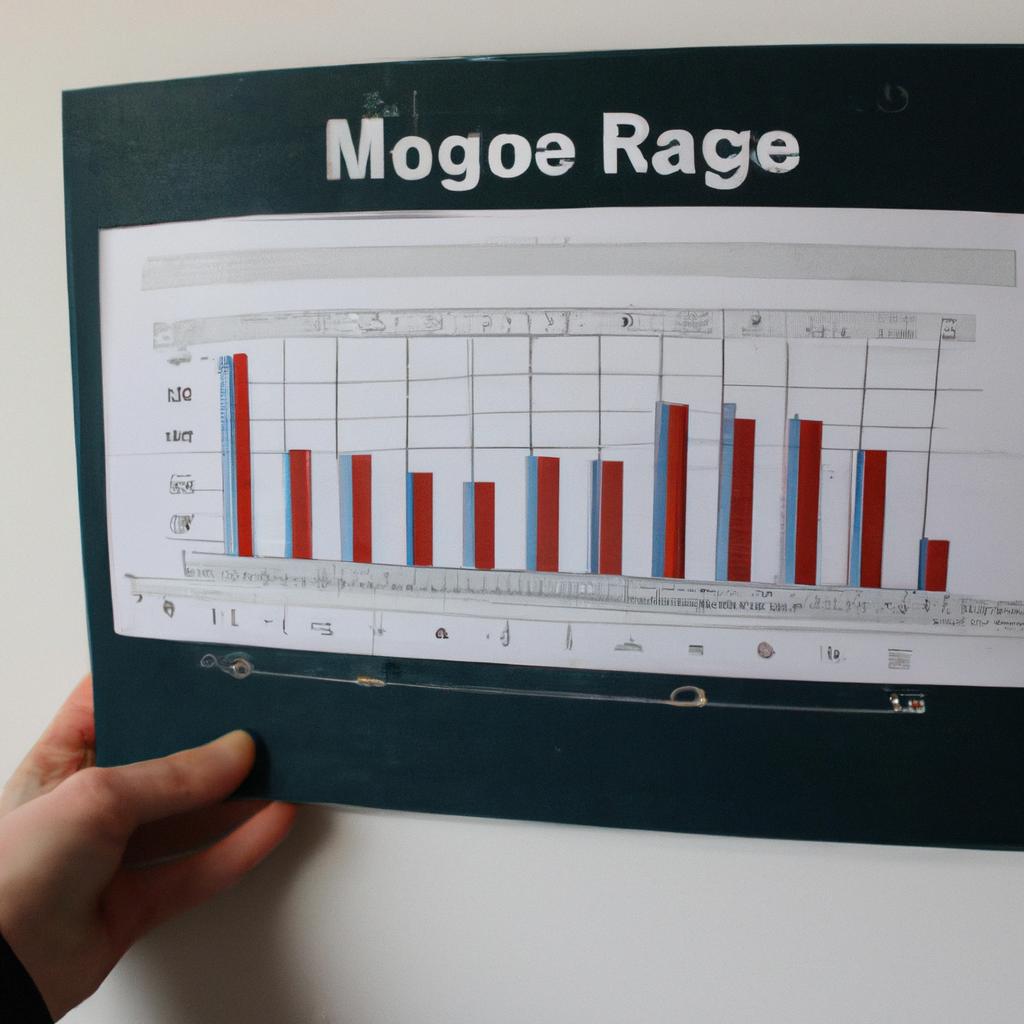In today’s real estate market, potential homebuyers seeking to purchase high-priced properties often turn to jumbo loans. These specialized mortgage products are designed for borrowers looking to finance homes that exceed the conforming loan limits set by government-sponsored enterprises such as Fannie Mae and Freddie Mac. For instance, consider a hypothetical scenario where John is interested in purchasing a luxurious beachfront property worth $2 million. In this case, obtaining a jumbo loan would be necessary due to the property surpassing the maximum loan limit set by conventional mortgages.
Jumbo loans offer unique features and considerations when it comes to mortgage rates. Unlike conventional mortgages, which typically have lower interest rates due to their eligibility for securitization on secondary markets, jumbo loans carry higher interest rates reflecting the increased risk associated with these larger loans. Lenders face greater exposure when financing high-value properties, leading them to charge higher borrowing costs to compensate for potential losses or defaults. As a result, understanding how mortgage rates function within the realm of jumbo loans becomes crucial for prospective buyers aiming to secure financing for their dream homes beyond the conforming limits.
What are jumbo loans?
Jumbo Loans: Mortgage Rates
A jumbo loan refers to a type of mortgage that exceeds the conforming loan limits set by government-sponsored enterprises such as Fannie Mae and Freddie Mac. These loan limits vary depending on location but generally range from $484,350 to $726,525 for most parts of the United States in 2019. To illustrate this concept further, let’s consider an example:
Imagine a prospective homebuyer, John, who is looking to purchase a luxurious property in an upscale neighborhood. The price tag on the house he desires amounts to $1 million. Since this amount surpasses the maximum limit defined by conforming loans, John will need to apply for a jumbo loan.
To better comprehend the implications of obtaining a jumbo loan compared to conventional financing options, it is essential to understand some key aspects:
- Loan Amounts: Jumbo loans allow borrowers to finance higher-priced properties beyond what traditional mortgages cover.
- Interest Rates: Due to their larger size and increased risk exposure for lenders, interest rates on jumbo loans tend to be slightly higher than those offered for conforming loans.
- Qualification Requirements: Obtaining approval for a jumbo loan can be more rigorous, requiring applicants to demonstrate stronger creditworthiness and financial stability.
- Down Payments: Jumbo loans usually necessitate larger down payments compared to conventional mortgages.
By examining these factors through both emotional evocations and informative structures like bullet point lists and tables, we gain insight into the intricacies surrounding jumbo loans. In the subsequent section, we will delve further into how exactly these loans differ from conventional ones without explicitly stating “step.”
How do jumbo loans differ from conventional loans?
Jumbo loans, also known as non-conforming loans, are mortgages that exceed the loan limits set by government-sponsored enterprises like Fannie Mae and Freddie Mac. These loans are typically used to finance higher-priced properties in areas with high housing costs. To better understand how jumbo loans differ from conventional loans, let’s consider an example.
Imagine a potential homebuyer named Sarah who is interested in purchasing a luxury property worth $1.5 million. Since this amount surpasses the loan limit established for conventional mortgages, Sarah would need to apply for a jumbo loan instead.
Now, let’s explore some key differences between jumbo loans and conventional loans:
- Loan Limits: Conventional mortgages have maximum loan limits defined annually by government entities such as Fannie Mae or Freddie Mac. In contrast, there is no specific cap on the loan amounts associated with jumbo loans.
- Down Payments: Typically, lenders require larger down payments for jumbo loans compared to conventional mortgages. While 20% is often considered standard for a down payment on a jumbo loan, it may vary depending on the lender’s requirements.
- Credit Requirements: Jumbo loans tend to be more stringent in terms of credit score criteria than traditional mortgage options. Lenders generally expect borrowers applying for jumbo financing to have excellent credit scores (typically above 700) and a low debt-to-income ratio.
- Interest Rates: Due to their increased risk exposure and larger loan amounts, interest rates for jumbo loans are usually higher than those offered for conventional mortgages.
To further illustrate these differences visually, here is a table comparing selected features of jumbo and conventional loans:
| Features | Jumbo Loans | Conventional Loans |
|---|---|---|
| Loan Amount | No specific cap | Government-set limit |
| Down Payment | Larger requirement | Potentially lower |
| Credit Score | Excellent required | More flexible |
| Interest Rates | Higher | Potentially lower |
As evident from the table, jumbo loans present distinct characteristics that set them apart from conventional mortgages. Understanding these differences is vital for prospective homebuyers like Sarah who are considering financing options for high-value properties.
Moving forward, we will explore the factors influencing jumbo loan rates and how borrowers can navigate this complex aspect of mortgage lending without compromising their financial goals.
What factors affect jumbo loan rates?
Jumbo loans, also known as non-conforming loans, are mortgages that exceed the loan limit set by government-sponsored entities like Fannie Mae and Freddie Mac. These loans cater to individuals looking to finance high-value properties that surpass the limits for conventional loan programs. Understanding the key differences between jumbo loans and conventional loans is crucial when considering mortgage options.
One example of a scenario where a jumbo loan may be required is when an individual intends to purchase a luxury home in an affluent neighborhood. Let’s consider Mr. Smith, who wishes to buy a property worth $2 million. In this case, because the price exceeds the conforming loan limit established by Fannie Mae and Freddie Mac (which currently stands at $548,250), Mr. Smith would need to opt for a jumbo loan instead of a traditional mortgage.
To further highlight the distinctions between these two types of mortgages, here is a comparison:
- Loan Limit: Conventional loans adhere to specific borrowing limits determined by government-backed agencies, while there is no maximum limit on jumbo loans.
- Down Payment: Jumbo loans often require larger down payments compared to conventional mortgages due to their higher risk nature.
- Credit Score: Borrowers seeking jumbo loans typically need excellent credit scores since lenders impose stricter eligibility criteria than those for conventional mortgages.
- Interest Rates: Jumbo loan rates tend to be higher than those for conventional mortgages due to increased risk exposure for lenders.
| Loan Feature | Conventional Loan | Jumbo Loan |
|---|---|---|
| Loan Limit | Set by guidelines | No maximum limit |
| Down Payment | Varies depending on lender requirements | Often requires more substantial down payment |
| Credit Score | Good credit score generally sufficient | Requires excellent credit score |
| Interest Rates | Generally lower than jumbo loans | Tends to be higher due to increased risk exposure |
Considering the unique characteristics and requirements of jumbo loans, it is important for potential borrowers to assess their financial situation carefully. By understanding these differences, individuals can make informed decisions when selecting the most suitable mortgage option for their needs.
Transitioning into the subsequent section:
Now that we have explored how jumbo loans differ from conventional loans, let us delve further into an essential aspect: comparing jumbo loan rates with those of traditional mortgages. Are jumbo loan rates higher than conventional loan rates? Let’s find out in the next section.
Are jumbo loan rates higher than conventional loan rates?
Jumbo Loans: Mortgage Rates
In the previous section, we discussed the concept of jumbo loans and their significance in the mortgage market. Now, let’s delve into the various factors that can influence jumbo loan rates. To illustrate this, consider a hypothetical case study involving two borrowers seeking jumbo loans for properties of similar value.
Case Study:
Borrower A has an excellent credit score of 800, a stable income with low debt-to-income ratio (DTI), and a substantial down payment of 30%. On the other hand, Borrower B has a lower credit score of 650, higher DTI due to existing debts, and only manages a down payment of 10%.
Factors Affecting Jumbo Loan Rates:
-
Creditworthiness: Lenders assess borrower risk by evaluating their credit scores. Higher scores generally result in more favorable interest rates compared to lower scores.
-
Down Payment: The amount put towards the initial purchase plays a significant role in determining interest rates on jumbo loans. Larger down payments typically lead to better terms since they reduce lender exposure.
-
Debt-to-Income Ratio (DTI): This metric measures how much debt burden a borrower carries relative to their income. Lower DTIs indicate stronger financial stability and may result in lower interest rates.
-
Economic Conditions: The overall state of the economy influences jumbo loan rates as lenders adjust pricing based on market conditions such as inflation, unemployment levels, and changes in government policies.
- Financial security is enhanced when borrowers have excellent credit scores.
- Higher down payments provide peace of mind and reduce long-term costs.
- Managing debt responsibly leads to improved affordability and flexibility.
- Sensitivity to economic trends empowers borrowers to make informed decisions.
Table – Impact Factors on Jumbo Loan Rates:
| Factors | Impact |
|---|---|
| Creditworthiness | Higher credit scores result in more favorable interest rates. |
| Down Payment | Larger down payments typically lead to better loan terms. |
| Debt-to-Income Ratio | Lower DTIs indicate stronger financial stability and may result in lower interest rates. |
| Economic Conditions | Market fluctuations can influence jumbo loan rates based on economic trends, inflation, and policies. |
In consideration of these factors, lenders determine the mortgage rate for jumbo loans to mitigate risks associated with larger loan amounts.
Moving forward into the next section about “How can borrowers qualify for jumbo loans?”, it is essential for borrowers to understand how they can meet lender requirements while taking advantage of competitive interest rates.
How can borrowers qualify for jumbo loans?
Jumbo Loans: Mortgage Rates
Are jumbo loan rates higher than conventional loan rates? As mentioned in the previous section, jumbo loans are typically associated with higher interest rates compared to conventional loans. Let’s consider an example to illustrate this further. Suppose a borrower is seeking a $1 million mortgage for a luxury home purchase. If they opt for a jumbo loan, their interest rate might be around 4%, resulting in a monthly payment of approximately $4,774 (excluding taxes and insurance). On the other hand, if they choose a conventional loan, which generally offers lower rates, say 3.5%, their monthly payment would decrease to approximately $4,491.
There are several factors that contribute to the higher interest rates on jumbo loans. Firstly, lenders face greater risk when offering larger loans as these borrowers may have less stable financial situations or present a higher likelihood of defaulting. Secondly, there is often less secondary market demand for jumbo loans due to stricter underwriting requirements imposed by investors. This leads many lenders to keep these mortgages on their own books rather than selling them off like conventional loans.
Understanding why jumbo loan rates tend to be higher can help potential borrowers make informed decisions about their financing options. It is essential to carefully evaluate one’s financial situation before committing to such large debt obligations. Now let’s explore how borrowers can qualify for jumbo loans and what benefits they offer in terms of homeownership opportunities.
Benefits of Jumbo Loans:
- Increased purchasing power: Jumbo loans allow buyers to afford high-value properties that may not be attainable through traditional financing.
- Tailored solutions: Lenders who specialize in jumbo mortgages often provide personalized options based on individual needs and circumstances.
- Portfolio diversification: For affluent individuals looking to diversify their investments beyond stocks or bonds, real estate acquisition through jumbo loans presents an attractive alternative.
- Competitive interest rates: While it is true that jumbo loan rates are generally higher, borrowers with excellent credit histories and substantial down payments may still qualify for competitive interest rates.
These benefits highlight the potential advantages of utilizing a jumbo loan to finance larger real estate purchases. By understanding the requirements and exploring financing opportunities, borrowers can make informed decisions when considering this type of mortgage. In the subsequent section, we will delve into the specific benefits of jumbo loans and how they contribute to homeownership opportunities.
What are the benefits of jumbo loans?
Jumbo Loans: Mortgage Rates
How can borrowers qualify for jumbo loans? In the previous section, we discussed the qualifications that borrowers need to meet in order to be eligible for jumbo loans. Now, let’s delve into the benefits of these loans and how they can impact borrowers’ finances.
To better understand the advantages of jumbo loans, consider this hypothetical scenario: John and Sarah are a couple looking to purchase their dream home in an affluent neighborhood. The property they have set their sights on exceeds the conforming loan limits established by Fannie Mae and Freddie Mac. As a result, they need to seek a jumbo loan to finance their home purchase.
One major benefit of jumbo loans is that they offer competitive interest rates compared to other mortgage options. This allows borrowers like John and Sarah to secure financing at favorable terms even though they are borrowing a larger amount than what is considered conventional. Additionally, jumbo loans often come with flexible repayment terms tailored to individual financial situations, providing more freedom and convenience for borrowers.
Here are some key features that make jumbo loans attractive:
- Higher loan amounts: Jumbo loans allow individuals to borrow beyond the conforming loan limits.
- Luxury properties: These loans cater specifically to high-value properties such as luxury homes or estates.
- Investment opportunities: Borrowers may utilize jumbo loans for investment purposes in real estate markets where prices exceed conforming loan limits.
- Customized solutions: Lenders who specialize in jumbo loans can provide personalized advice and assistance throughout the application process.
Furthermore, it is important to note some considerations when opting for a jumbo loan:
| Considerations | Impact |
|---|---|
| Larger down payment requirement | Requires borrowers to have significant cash reserves |
| Stringent eligibility criteria | May necessitate excellent credit scores and low debt-to-income ratios |
| Potential higher closing costs | Can increase overall expenses associated with acquiring the loan |
In summary, jumbo loans offer borrowers the opportunity to secure financing for high-value properties that exceed conforming loan limits. With competitive interest rates and flexible repayment terms, these loans provide attractive options for individuals seeking to purchase luxury homes or invest in real estate markets with higher property values. However, it is crucial for potential borrowers to carefully consider the larger down payment requirements, stringent eligibility criteria, and potential higher closing costs associated with jumbo loans before making a decision.
 SMI Loan
SMI Loan



